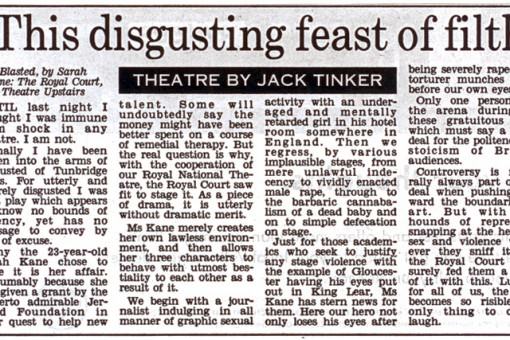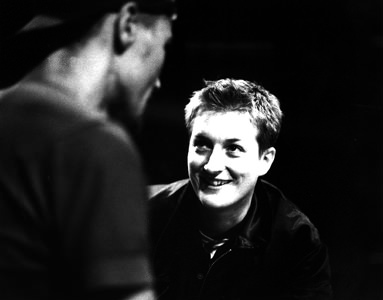“No one survives life.” Will we ever know?
Sarah Kane is a controversial English playwright, and in her plays shows themes of redemptive love, sexual desire, pain, cruelty, and death. She struggled with intense manic depression her entire life but she never stopped working, and for a short period was the writer-in-residence at the Royal Court theatre.
Her earlier plays are characterized by the use of a lot of violent scenes and the language in her plays is, pared-down and poetical intensive.
BIOGRAPHY
Sarah Kane is born in Brentwood, Essex, 1971, and raised by evangelical parents. She was a committed Christian in adolescence but later, she rejected her religious beliefs. She attended Shenfield High School, she studied drama at Bristol University, graduating in 1992, and took on an MA course in playwriting at the University of Birmingham.
Kane struggled with severe depression for many years and was twice voluntarily admitted to the Maudsley Hospital in London, but, she wrote consistently, throughout her life. She was writer-in-residence for Paines Plough, where she encouraged other writers.
FROM THE BEGINING…
Her first play, Blasted, created the biggest theater scandal in London since the baby stoning scene in Edward Bond’s play Saved, an author Kane adored and who defended Kane’s play. Samuel Beckett, Howard Brenton, and Georg Büchner, whose play Woyzeck she once directed, were the dramatist who influenced Kane’s work.

The Daily Mail described her first play as “this disgusting feast of filth”, but she is later acknowledged as “a major force in British theatre“ the essential figures of the so-called In-year-face theatre, whose promising career was brought to a premature end by her suicide in 1999. The change of critical opinion occurred with Crave, her fourth play.
The play was published under the pseudonym of Marie Kelvedon to allow critics to analyze it „not as another play by the author who lets characters suck out other characters’ eyes or barbecue genitals“. Crave concentrates on four characters, (named with a letter only) each only having a letter for a name, stuck in relationships with each other, and layers that can only be understood after a thorough watching.
TILL THE END…
Her later plays, like Crave and her adaptation of Phaedra’s Love, are widely accepted, and have been called an important voice. But she is battling fierce depression, so in early 1999 she attempts suicide by taking 200 pills and was saved, but just two days later, she hangs herself in a London hospital.
She leaves behind final versions of her plays, including a new one called 4.48 Psychosis and instructions to produce her work often but never to adapt them into films or authorize any biographies.
Her earlier texts have been reread „beyond the surface revealing complex characters whose bruises are on a psychological level much more so than on a physical one“.
4.48 Psychosis
Her last play, 4.48 Psychosis, was completed shortly before she died and was performed a year after her death. In 2001, the Royal Court Theatre, which had staged premieres of all but one of her stage plays, produced a season of her work. The critics were unanimous in their acclaim for the woman they had once scorned as reminding them of ‘the naughtiest girl in the class’. Her influence on the next generation of writers remains to be seen.

Kane, I praised worldwide, even by her enemies, The Herald who connotated that she is insane now described her as one of the most incredibly talented people on the British stage.
4.48 Psychosis opens in 2000 at the Royal Court, but her brother Simon Kane Fearing that literal-minded Americans would see Kane as another Sylvia Plath rejected an American production. in 2004, Macdonald’s 4.48 Psychosis is shown at St. Ann’s Warehouse in Brooklyn, which wanted to present a Kane production for awhile.
Though Kane’s work never played to large audiences in the UK and was at first dismissed by many newspaper critics, her plays have been widely performed in Europe and South America.
At one point in Germany, there were 17 simultaneous productions of her work.
Kane’s Blasted as “one of the most important New York premieres of the decade.” By the theatre critic Ben Brantley of the New York Times In November 2010.












